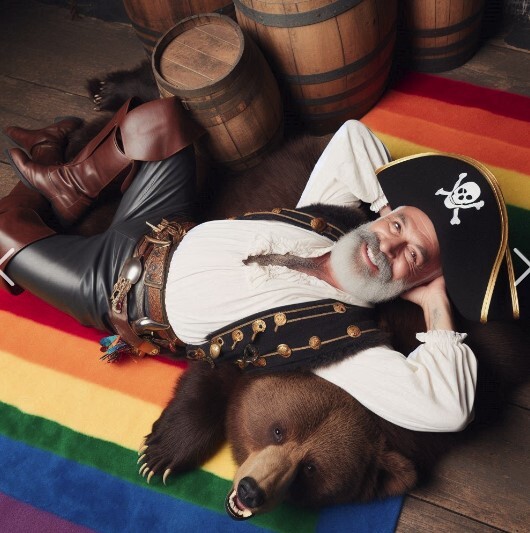



Summary: A recent UK government inquiry into the challenges faced by the film and high-end television industry has recently received submissions from major Hollywood studios advocating for KYC (know your customer) rules for hosting providers, similar to banking regulations to identify money laundering. If adopted, this would help them to identify people hosting pirated content.
The submissions are united in identifying the same solution to this problem: the UK must implement a ‘Know Your Business Customer’ regime to compel commercial entities (including online intermediaries) to establish the true identity of their business customers as a precondition for selling, and receiving payment for, digital services.

The inverse should also be true … if businesses want to know about their customers … customers should also know every detail about the business they are dealing with.
When we pirate its called breaking the law
When they pirate, it’s just another normal business day
And in case you don’t know what they pirate … they pirate profits, raid workers unions, scavenge privacy rights and invade your personal space

Remember the actor strikes this year? One of the demands was to keep AI from copying the likeness of the actors and using that to replace them.
And these mother fuckers have the nerve to be worried I’m copying shit.

Also, they still break the law and ask the question: “What the fuck are you going to do about it? Sue us?”

They like to whine and cry that piracy makes them lose money, but the opposite is true (at least in my case.) I wouldn’t have bought half the games I did if I hadn’t first pirated them to try them out. I’m certainly not tossing $60+ dollars on something I “might” like otherwise.

That’s called an inconvenient truth. The fact of the matter is, if piracy was eradicated, concerts would be near empty and no one would know the music. Films that don’t leak don’t generally do as well unless you count blockbusters and even then, take Spider-Man, even if people pirate, fans will go and see it a few times. The problem isn’t the piracy, it’s that they can’t profit off of it directly.

I disagree on the concert front. How many people really discover new music through piracy? Sure, downloading it once you know about it, but these days I doubt it’s a way most people discover new stuff.

How many people really discover new music through piracy?
Everyone I’ve ever known. I mostly listen to metal, which undeniably became what it is because of people mailing pirated cassettes in the early 80s. 8 of my 10 favorite bands, I discovered by finding someone with good taste on Soulseek and grabbing the stuff I’d never heard of before. Piracy is key in the spread of underground music.
Artists that sell out stadiums wouldn’t be affected much, but the ones that actually need the concert income absolutely would.

That type I think blurs the line on what actually is piracy versus the guy handing out demo tapes on the corner. It’s a sort of a ‘I absolutely don’t want you to go download my stuff, particularly from this link or this link…’
During the height of the RIAA’s rampage and shortly after some groups started actively promoting the model of give away the music, buy the special package. NIN Ghosts comes to mind as one that from what I gather did pretty well.
The face of music piracy seems to have changed a lot though. It used to be that buying albums was expensive, particularly when it was one good song and a bunch of crap. The $1/song thing was clunky, disorganized, and the early efforts with DRM sucked. Now things like Spotify exist and let someone play as much as they like for the price of roughly an album a month and have taken a big lead in making stuff that never would have been on the old radio known.
Music piracy now seems to have shifted to filll in the role that the weird little record shop in the corner of the mall used to play. Finding and keeping those imports, bootlegs, live tapes, etc that you’ll never find on a standard service. Or when places like Spotify yank something that I liked because of some licence BS and say it’s not available well…

That type I think blurs the line on what actually is piracy versus the guy handing out demo tapes on the corner. It’s a sort of a ‘I absolutely don’t want you to go download my stuff, particularly from this link or this link…’
Not at all. I don’t mean artists distributing their own tapes; this was primarily fans copying the tape they bought, recording off the radio, or recording bootlegs of concerts. (see also) There was even the ad campaign driving home that making your own cassettes in such a manner is illegal and “killing the music industry,” which is obviously didn’t.
As for the rest of what you said, I think it’s important to keep that not everyone obtains music the same way. Plenty of people use ripping software, modified client software, etc. to pirate via streaming services too. It’s not just filling a niche, but a reliable source of mainstream music too (assuming you do it before they pull it down because of the licensing BS). And as a frequent Bandcamp patron, albums can still be expensive and most songs still cost $1 (though, without the shit DRM).


Indeed it was, and there was pushback even then. I was more referencing the tacit approval of piracy rather than active distribution.
The game will always keep evolving. The labels/publishers no longer have much of their previous gatekeeper status but now a new challenge of clearing the signal to noise ratio and having anyone take note amongst the multitudes of options is out there.
The reliability/archivist aspect is a beautiful thing that helps prevent the masking of the past. I keep a number of digital artifacts just to keep them preserved myself. There are a lot of bits of culture only existing today because someone once made a tape off the TV/Radio.

How many people really discover new music through piracy?
I did. I wanted some songs, found a Top 100 whatever-its-called that had these songs and 90-something more, so I downloaded, and even seeded back (on a public tracker) and then just listened to them all. Nowadays, my playlist continues to grow, but most of my songs are from that original 100.

That’s good, but what method do you use for finding new stuff after that? Genuinely curious, considering it myself.

Honestly, just recommendations from YT Music Revanced and Spotify via Xmanager.

The closest I get to discovering new music through piracy is game music. Otherwise I absolutely agree with that sentiment. I certainly ain’t finding out about new bands/singers/whatever pretty much ever through piracy unless it’s in the game I’ve found.

Yeah I do imagine that’s an exception.

Piracy is how I discovered MF DOOM and then I bought all his albums because I wanted to support.

I find it weird how “Hey, I want you to listen/watch to what I made.” transformed into “Hey, you can only listen/watch if you paid for it.”
Guess I won’t then…

Hey, you can only listen/watch if you paid for it…
…in increasingly convoluted, limited and expensive ways designed to force you to subscribe to multiple platforms in order to access the same content you had seven years ago except for a lot more money and a lot less choice!

This is it right here.
If I want to watch something, can I do it within 2 minutes?
Now? If it’s not in the current app I’m in and featured, unlikely.
Piracy? Through a handful of services, local or remote, I can be watching that movie in one place in 30 seconds in the highest quality.
What service was once decent has been ruined by capitalism again.

I’ve always wondered what the genuine ‘cost’ of pirating is. Like if someone from a developing country pirates then it doesn’t count because they wouldn’t have bought it any way due to the high price. And if someone from a developed country pirates, but there is no reasonable alternative, then that is void too. I wouldn’t be surprised if that number was really low. Why go through the trouble of pirating if you can pay for it and get a reasonable service?

Why go through the trouble of pirating if you can pay for it and get a reasonable service?
That’s why it’s a service problem.
As a student (around 5-6 years ago) my friend and I both payed for a netflix account via gift cards because we wanted it and didn’t have paypal or credit cards.
Now I pirate because there are way too many services, for too high of an asking price and fragmented catalog.
Want to see all the seasons of a show? Gotta subscribe to two or more services because one stroke a deal with the publisher while the 2nd got the other part.
Also censoring both in episode and by removing whole episodes, changing parts of something etc etc.
Fuck all the above. :|
I can just call up radarr, search the movie by the parameters I set up beforehand and decide what version I want and done.

Why go through the trouble of pirating if you can pay for it and get a reasonable service?
I literally don’t know any platform other than Steam that dose anything reasonable with digital content.

I’d argue Bandcamp does Artists set the price, and the files downloaded are .flac or mp3 without any DRM.
They got sold, which resulted in layoffs recently…so no telling how long it lasts. But right now, they’re reasonable in my book.

Not only its cheaper but also the service is starting to get better than if you’d pay for it

Louis Rossman’s recent video on this is good.
And yeah, my Plex server doesn’t fuck me about the way the streaming services do.

Here’s my take on it. Things like Radarr, Sonarr, Jackett, etc offer a better service then Disney+, Netflix, Hulu, etc. Devs could charge for the *arrs and a lot of people would pay. Why? Because it’s completely a la carte. Right now if there are say three shows I’m interested in then I could have to pay for three different streaming services. But not only that, I would also have to be concerned with whether or not that show is leaving the platform anytime soon. In the case of Hulu, not only do I have to worry about paying them but I also have to worry about paying them enough that I don’t have to watch ads after paying them.
Likewise with video games, there are games that have DLCs that require previous DLCs to fully unlock what they include. In other words, it is paywalling already paywalled content. I don’t have a problem with the content, I have a problem with the way they present the content.

Lol, capitalists will never learn. I’m not going to suddenly magically buy your shit with money I don’t have.

😂 you forgot the point where you double and triple buy overlapping streaming offerings because everyone gatekeeps their exclusives

hosting can be anywhere. This will kill the UK hosting industry, and they’ll move to NL.
The only way to hunt pirates is to hire ninjas

Didn’t you guys just take a damn hammer to your streaming plans?
@Flatworm7591 Tagging Lemmy Post ‘Hollywood to UK Govt: Investigating Pirates “Increasingly Difficult” * TorrentFreak’ (https://lemmy.dbzer0.com/post/8855303): #Piracy